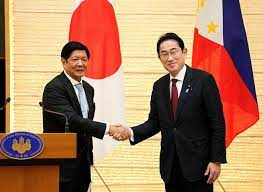MANILA: President Ferdinand Marcos Jr said on Sunday he saw no reason why the Philippines should not have a Visiting Forces Agreement (VFA) with Japan if it would boost maritime security and ensure greater protection for Filipino fishermen.
Marcos, however, also told reporters he would exercise care in pursuing a potential pact with Tokyo “because we do not want to appear provocative.”
Marcos’ first visit to Japan since taking office came after he recently granted the United States access to additional military bases in the Philippines under a VFA, a move which China said undermined regional stability and raised tensions. The VFA provides rules for the rotation of thousands of U.S. troops in and out of the Philippines for exercises.
“If it will be of help to the Philippines in terms of protecting, for example our fishermen, protecting our maritime territory … I don’t see why we should not adopt it (VFA),” Marcos told reporters before returning home on Sunday, according to an official transcript.
Marcos was in Japan for a five-day visit, to forge closer security ties with Tokyo, which in December announced its biggest military-build up since World War Two, fuelled by concerns about aggressive Chinese actions in the region.
Marcos and Prime Minister Fumio Kishida penned a deal to allow their armed forces to work together during disaster relief, an agreement seen as a step towards a broader pact that could allow the countries to deploy forces on each other’s soil.
“I always think about the need to protect our fishermen. We need to show clearly we are patrolling our waters and making sure that our maritime territory is clearly recognised,” Marcos said.
The Philippines has a VFA with the United States, while Tokyo has VFAs with Australia and Britain, and also hosts the biggest concentration of U.S. forces abroad.
Japan held military exercises with the United States and the Philippines as recently as October, and its military presence in the Philippines could help counter Chinese influence in the South China Sea, much of which Beijing claims, including the territory that Manila considers its own.
Kishida said the Philippines and Japan had agreed to try and establish a framework that would “strengthen and smooth the process of holding joint exercises.”
In an interview with Nikkei on Sunday, Marcos said his country could be pulled into a possible conflict in the Taiwan Strait because of its proximity to the self-ruled island regarded by China as a breakaway province.
“When we look at the situation in the area, especially the tensions in the Taiwan Strait, we can see that just by our geographical location, should there in fact be conflict in that area … it’s very hard to imagine a scenario where the Philippines will not somehow get involved,” Marcos said.


